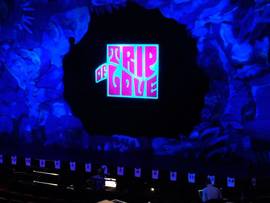
Trip of Love, the spectacular little show that could and did, ended its house-breaking run at Stage 42 with its Sunday matinée on August 7th, 2016, a bittersweet tour de force that provided that rarest of things — a sharp and exciting, emotionally packed and perfectly executed moment of musical theatre that will long be remembered by everyone lucky enough to have been there.
This incomprehensibly underrated show, directed, choreographed and co-designed by James Walkski, was an intense and deeply well-researched labor of love, and of hard and committed labor by everyone involved. With sumptuous, handcrafted, detailed costumes by Gregg Barnes, and disarmingly fresh, intricate and exciting musical arrangements by Martyn Axe, flawlessly performed by a kick-ass pit band of six, Trip of Love was also an oddity that defied easy classification or definition.
Essentially a dance show with amazing singers that could actually dance, Trip of Love was ultimately done in by a glib, mean-spirited, ultimately lazy opening night New York Times review, as well as by an ad campaign that never quite knew what it was selling or how to communicate its quality or fun to an American audience.
Originally mounted and produced in Osaka by Makoto Deguchi, who also produced the profitable and long-running Blue Man Group in New York, Trip of Love was created in Japan for a Japanese audience with many members of the current American cast in what was essentially a tribute to 1960's American culture, music and style — but seen through Japanese eyes, an important distinction.
This Japanese quality was obvious in a wealth of details — the arguably odd song selections and their order, the gorgeous costumes with their clever variations of kimono, the modern and sexy update of a Noh Theatre Taiko Lion Dance performed by the female ensemble, the recurring stylized disco TV setup so reminiscent of local Japanese television, to name a few.
Although most audiences were on their feet by evening’s end, not embracing or sharing any of this background simply confused and alienated others. Many arrived expecting a story-driven Mamma Mia, School of Rock or Kinky Boots, but left irritated at having witnessed instead a plotless Jerome Robbins' Broadway or a Bob Fosse’s Dancin' — shows with great choreography and virtuoso ensemble performances, shows Trip had much more in common with.
The television ad campaign in particular stressed and highlighted the songs — an impressive list to the brand-obsessed Japanese, but meaningless and off-putting to a New York audience — and the ad copy, mostly lifted from the program's notes describing the '60's as "a time when innocence was lost" or inviting "a trip back to the 60’s," did little to entice audiences or adequately describe the real and unique miracle of this production — namely the tremendous talent working their collective asses off nightly onstage. Bar (or perhaps "barre") set high from the beginning, this cast exceeded that standard time and again, incredibly becoming even better and tighter during the course of the run.
This last can’t be described adequately or stressed enough, but the real and enduring truth and success of Trip of Love was its cast of young, extremely talented and gorgeous dancers and singers in absolutely top form, in their prime, fueled on by the obvious joy of night after night realizing a wide range of incredibly difficult, complicated, tricky and fun choreography, material and vocal arrangements, and sharing that joy with audiences and each other.
Ensemble theatre at its best, the entire cast was always in sync, always fully committed, no egos in sight, tightly working together, everyone always performing full-out with a sharp sparkling energy regardless of audience or attendance. No stars onstage, but all stars, each and every one of them.
All of which makes this closing so sad and unfortunate. Trip of Love, like Blue Man Group or even Mummenschantz — both shows that were always and obviously different and “other” — is a show that could and should have run forever, particularly in its 42nd Street location. It’s a pity that the intelligence and wit that went into the substance and art of the production was never matched by its marketing, an unfortunate failure of imagination.
Emotions ran high in Trip’s final performance. The ensemble’s Wipeout was met with a tremendously extended and well-deserved ovation that stopped the show, and the final moments of Moon River, California Dreamin’ and If You Go Away were especially poignant, the finality of the afternoon seeming to kick in for cast and audience.
Beloved R&B star Darlene Love, who was booked for the last four performances, belted out effective if under-rehearsed vocals, and Nia Sioux, late of cable TV’s Dance Moms and inserted into the ensemble for the show’s last weeks, managed to at least keep up with a cheerful energy. In the end, though, both were odd and unnecessary additions to a show that had always been balanced by its strong, even casting and ensemble work.
Austin Miller, Joey Calveri and David Elder as usual delivered the solid, soaring vocals that so often stopped the show; Bahiyah Hibah was coy and playful as always; Tara Palsha Moats, with her traffic-stopping looks, her welcoming warmth, smile and tremendous voice that just got better and stronger, was completely off the charts that afternoon; Yesenia Ayala was again languorous and beautiful as ever in her last Ipanema samba, and Ashley Fitzgerald Kelly’s sharp and remarkable dancing was strong and interesting as ever.
Finally, Kelly Fulthous, as always relentlessly charming and game, whose unstoppable energy, smile, wit and huge voice were the driving force of every performance, was once again the soul and center of this Trip of Love.
It will be missed.
 RSS Feed
RSS Feed